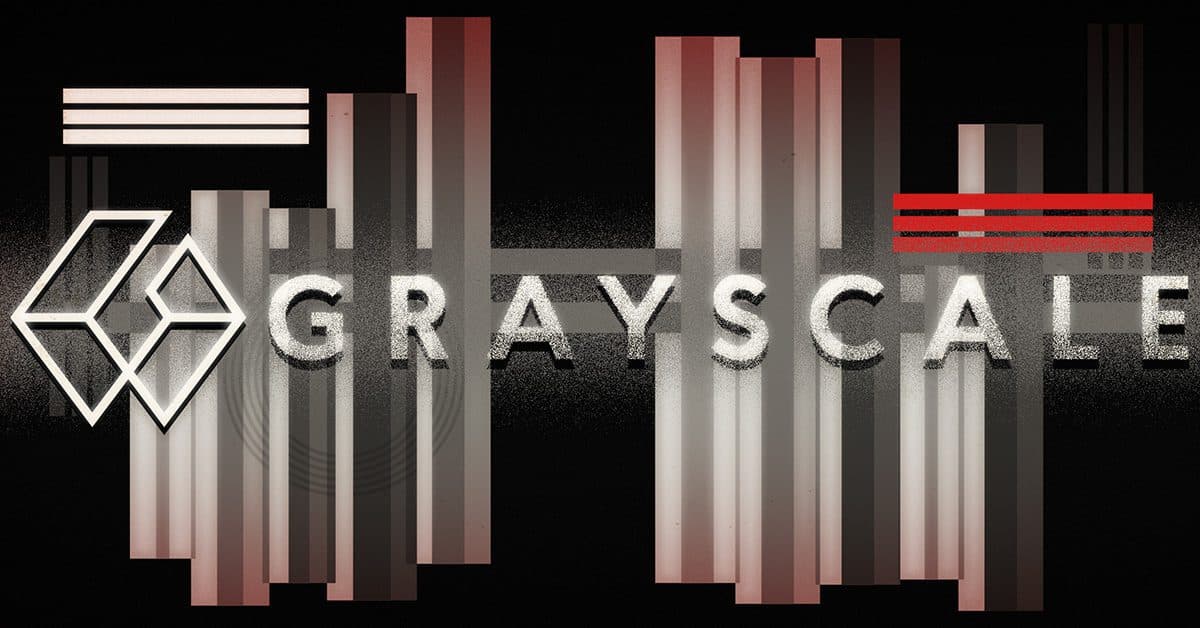First Grayscale ETF Begins Trading With Aim of Tracking Digital Economy
“What we’re doing here is really defining what the digital economy is as opposed to replicating bitcoin in the form of an equity ETF,” Grayscale’s head of ETFs said

Blockworks exclusive Art by Axel Rangel
- Top holdings in the index the new ETF tracks include Silvergate Capital, PayPal, Coinbase, Block and Robinhood
- The ETF is available on NYSE Arca and carries an expense ratio of 70 basis points
Grayscale Investments’ first ETF began trading Wednesday with the aim of investing in companies working to build out the digital economy.
As opposed to replicating the performance of crypto markets, The Grayscale Future of Finance ETF (GFOF) focuses on companies transforming the landscape for digital assets, according to Dave LaValle, the firm’s global head of ETFs.
“While we have seen lots of thematic products come to market in general, I don’t think we have seen a product come to market that is what we’re tackling here with GFOF,” LaValle told Blockworks. “What we’re doing here is really defining what the digital economy is as opposed to replicating bitcoin in the form of an equity ETF.”
The company had $33.4 billion assets under management, as of Jan. 31 — including $24 billion in the firm’s Grayscale Bitcoin Trust (GBTC).
GFOF is available on the NYSE Arca and carries an expense ratio of 70 basis points. It doesn’t invest in cryptocurrencies directly or through the use of derivatives.
The fund tracks the Bloomberg Grayscale Future of Finance Index, which consists of asset managers, exchanges, brokerages and wealth managers involved in the digital economy.
Other companies included in the benchmark include technology providers focused on data and processing, as well as infrastructure companies involved in mining and energy management.
How unique is GFOF?
The index tracked 22 companies as of its Jan. 19 launch and will be rebalanced quarterly. The top holdings are Silvergate Capital, PayPal, Coinbase, Block (formerly Square) and Robinhood.
While Bloomberg has a number of indices that provide exposure to various cryptocurrencies, Dave Gedeon, global head of multi-asset indices at Bloomberg, said the product provides the most concentrated and diversified equity exposure to the space.
“It does not provide exposure to companies that have low exposure to the digital economy or companies that simply hold cryptocurrencies on their balance sheet,” Gedeon told Blockworks.
But Neena Mishra, director of ETF research for Zacks Investment Research, said the product resembles some already on the market. She noted similarities to VanEck’s Digital Transformation ETF (DAPP), for example, which, like the Bloomberg Grayscale Future of Finance Index, has Coinbase, Block and Silvergate in its top five holdings.
Amplify Investments’ Transformational Data Sharing ETF (BLOK), the largest blockchain ETF, launched in January 2018 and has about $920 million assets under management. BLOK and the index GFOF tracks each have Coinbase, PayPal, Silvergate and Hive Blockchain among their top 10 holdings.
Mishra noted that the Bloomberg index’s lack of exposure to semiconductors, compared to BLOK, is a key difference. BLOK also has double the holdings of the new index, she said.
The timing of GFOF’s launch could hinder its ability to gather assets, Mishra added, noting the recent price drawdowns for bitcoin and other cryptocurrencies.
“Even though blockchain technology has many more applications…investors generally associate blockchain- and cryptocurrency-related ETFs with the price of bitcoin,” Mishra said. “With the price of bitcoin down so much since November, it remains to be seen whether this ETF will see any interest.”
Sumit Roy, crypto editor and analyst at ETF.com, said Grayscale’s strong brand will likely help its ETF attract assets, but added that first-mover advantage has been important.
Invesco’s Crypto Economy ETF (SATO) and its Blockchain Users and Decentralized Commerce ETF (BLKC), both of which launched in October, have roughly $10 million in combined assets.
Looking ahead
Though self-directed investors, registered investment advisors (RIAs) and financial advisors are the main adopters of thematic ETFs, LaValle said, institutions will likely back products as they become more widely adopted.
As for future products, LaValle noted the firm is “unconstrained” in terms of how it could build its ETF franchise.
“It could be different investment themes … or it could be us really challenging the status quo on how ETFs are being constructed, how index methodologies are being developed and how we can take advantage of being a real disruptor and an innovator in the marketplace,” he said.
An ongoing focus for the firm is converting GBTC to an ETF. Grayscale filed to do so in October, and the US Securities and Exchange Commission (SEC) is expected to decide on the product in July, following a 240-day review period.
The SEC has not yet approved an ETF that would invest in cryptocurrencies directly.
Get the news in your inbox. Explore Blockworks newsletters:
- The Breakdown: Decoding crypto and the markets. Daily.
- 0xResearch: Alpha in your inbox. Think like an analyst.






